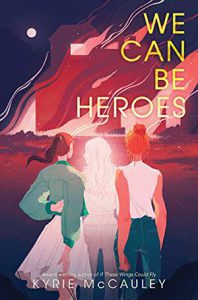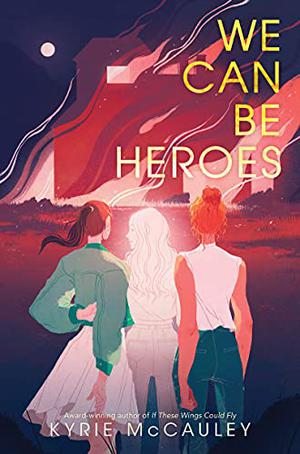 Collige virgo rosas is Latin for “gather, girl, the roses”—a favorite line of the dramatic and vivacious Cassandra Queen in Kyrie McCauley’s book We Can Be Heroes. But Cassie, who was a poet, a writer of music, and a budding actress, is now incorporeal—having been shot to death by her possessive and entitled boyfriend, Nico Bell. Seeking closure, Ghost Cassie returns to the town of Bell to take care of some unfinished business. Rather than accept a world where “it’s normal to lose someone you love to a bullet at school” (316), she wants the world to “read stories where girls are the heroes and our fates are neither written in the stars nor held in the palm of a man’s hand, but entirely our own” (182). Cassie wants Bell to celebrate sunflowers more frequently than guns.
Collige virgo rosas is Latin for “gather, girl, the roses”—a favorite line of the dramatic and vivacious Cassandra Queen in Kyrie McCauley’s book We Can Be Heroes. But Cassie, who was a poet, a writer of music, and a budding actress, is now incorporeal—having been shot to death by her possessive and entitled boyfriend, Nico Bell. Seeking closure, Ghost Cassie returns to the town of Bell to take care of some unfinished business. Rather than accept a world where “it’s normal to lose someone you love to a bullet at school” (316), she wants the world to “read stories where girls are the heroes and our fates are neither written in the stars nor held in the palm of a man’s hand, but entirely our own” (182). Cassie wants Bell to celebrate sunflowers more frequently than guns.
McCauley tells Cassie’s story through the teen’s two best friends: Vivian Hughes and Beck Jones. To memorialize her life and to vent their anger and disbelief at the loss of a classmate and treasured friend, the two girls create a series of murals with rich allusions to Greek mythology: Cassandra, Ariadne, Medusa, Andromeda, Circe, Helen, and The Fates. McCauley divides her novel into seven parts, dedicating each to the parallels between the original myth and Cassie’s life.
The book—which is a bit of a multi-genre work—shares its title with a podcast by Merit Logan, who has her own agenda, one that finds its own closure with the novel’s resolution. Texts of the podcast play a role in the novel, as do several poems written by Cassie.
Although McCauley’s book doesn’t shout for sweeping gun control laws, her characters do fight for legislation that would impose some common sense—such as closing the boyfriend loophole in the Violence Against Women Act of 1994. McCauley’s book is a painful reminder of what can happen when gun violence and misogyny collide, aided by the impulsive acquisition of a firearm.
Besides its social justice message, McCauley invites readers to consider liminal spaces—the space where all transition and transformation takes place. We often miss the real potential of these ‘in-between’ places because we either stand paralyzed at the threshold of such change or we flee quickly, hoping to avoid the discomfort. Unsure of the “new existence” that she must confront, not only Cassie but Vivian and Beck must traverse this sacred space where the old world falls apart and a bigger world is revealed. Under the influence of McCauley’s pen, the journey is fraught with grief, fear, and loss, but Beck is wild and fearsome, Vivian is practical and self-sufficient, and both are shaped by anger, so they are well-equipped to undertake the seismic shift in their worlds. With Vivian and Beck as their guides, readers will learn that events of great discomfort and loss are, in fact, survivable even though trauma isn’t something we bury and forget.
McCauley develops her characters with such expertise that it’s hard to believe they’re fictional. We all likely know someone shaped by anger or loss or driven by excitement and passion. Some of us also know intimately the exhaustion and aimlessness imposed by trauma. Perhaps that is McCauley’s gift—to exquisitely describe emotional responses and to capture friendship as something “made of laughter and light, our summers endless before us. . . [as we gather] all the roses our arms can bear” (342).
The daughter of two alcoholics who are killed in a vehicle crash, Beck is hard to approach, all rough edges and snark, but impossible to walk away from. She’s a painter, and an art supplies store is the closest thing to a church—a sanctuary—that Beck has ever known. Vivian is an athlete, a perfectionist, a list-maker, and an EMT who has the drive to be a doctor. She taught Beck to want more from life. Cassie taught them both to be brave: “It was brave to want things for yourself. It was brave to go after them” (307).
As the story unfolds, McCauley reveals how Cassie’s death, Vivian’s bullet wound, and Beck’s guilt have far-reaching repercussions. Beck’s grandpa tells Beck: “I’m proud of you for fighting for Cassie. That matters, Beck. It matters a lot. But don’t give up your whole future fighting for the past, okay? You gotta take care of yourself sometimes, too” (143).
Another moral comes in the arena surrounding the issue of gun control: what’s legal and what’s right aren’t always the same. A third comes from the arena of medical care: Even with all the training in the world, we still can’t save everyone.
This is an important book with a powerful message about survival.
- Posted by Donna

